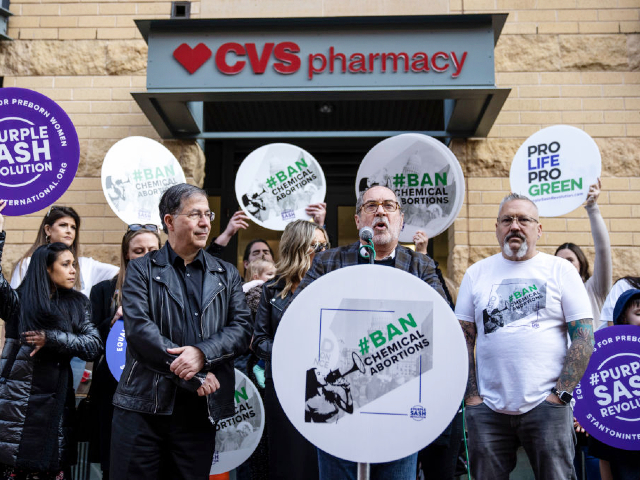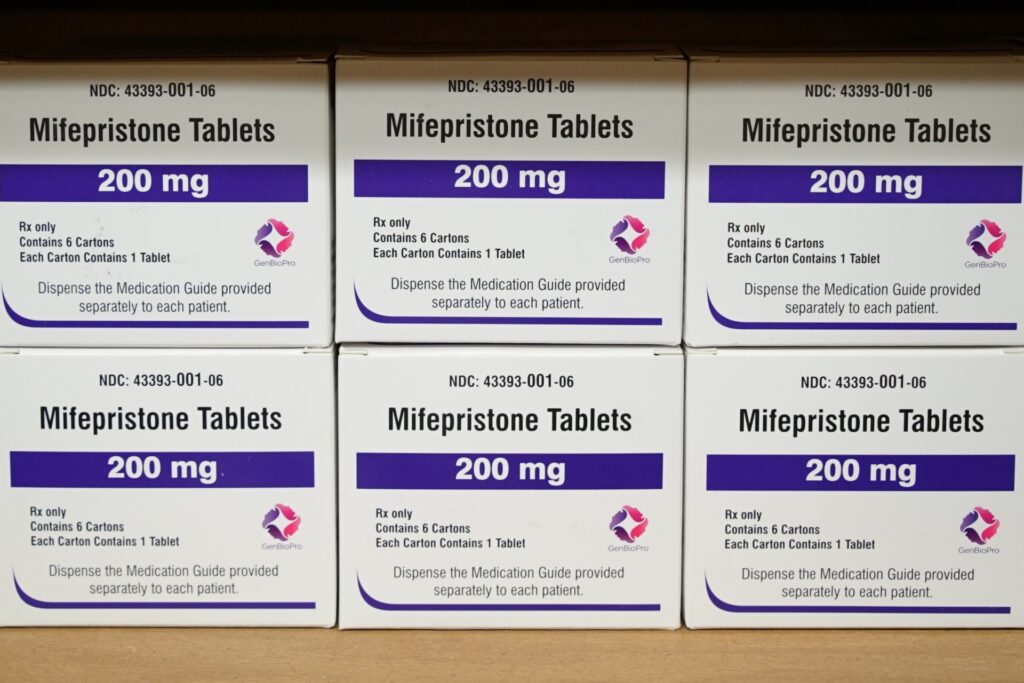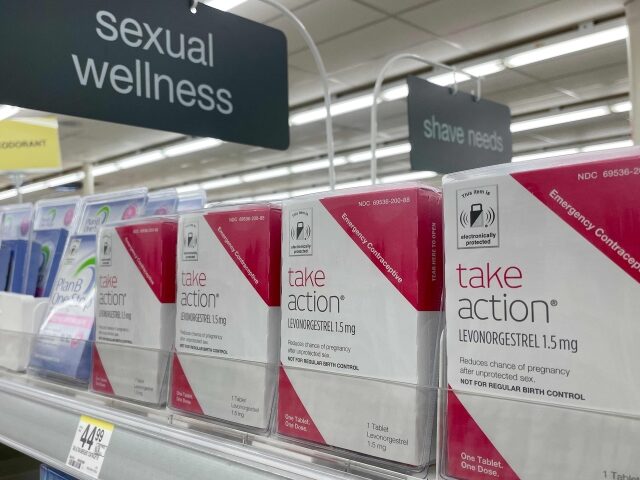Twenty-three Democrat state attorneys general sent a letter to the executive vice presidents of CVS Health and Walgreens on Thursday, urging the retail pharmacy chains to continue with their plans to dispense abortion pills following a U.S. Food and Drug Administration (FDA) regulatory change.
“In a time when access to abortion is under attack — now more than ever in the past 50 years — we stand in full support of pharmacies like Walgreens and CVS becoming FDA-certified to dispense and mail these essential medications and to make them available as broadly as possible,” the attorneys general wrote.

Anti-abortion activists rally against the availability of abortion pills at neighborhood pharmacies outside of a CVS Pharmacy on January 18, 2023 in Washington, DC. (Drew Angerer/Getty Images)
The Democrats slammed “anti-abortion states” for questioning the legality of pharmacies’ plans to dispense mifepristone, the first pill used in a two-drug medication abortion regimen.
“It is our understanding from your public statements that while you are committed to making these medications available as broadly as possible in your pharmacies in response to the FDA’s recent actions, you are equally committed to doing so in compliance with both state and federal law. To the extent the anti-abortion states’ letter implies otherwise, that is simply not accurate,” the letter reads.

Boxes of the drug mifepristone sit on a shelf at the West Alabama Women’s Center in Tuscaloosa, Alabama, on March 16, 2022. (AP Photo/Allen G. Breed)
The attorneys general further claimed that abortion pills are “exceedingly safe” and that studies have “repeatedly shown that complication rates are extremely low for both medication and surgical abortion.”
“Second, there is absolutely no evidence that providing abortion medications leads to ‘coerced abortion.’ Indeed, increasing abortion access, including access to these medications, empowers individuals seeking abortion to make the personal and confidential choice of which method of abortion is better for them based on factors including accessibility, medical history, age, cost, and a desire to avoid surgery,” the attorneys general claimed, ignoring evidence that predators and traffickers cover up their crimes via forced abortions.
The attorneys general also wrote that limiting access to abortion pills keeps “underserved groups” like “people of color, low-income people, people with disabilities, LGBTQ individuals, and those who live in rural areas” from being able to end the lives of their unborn babies using medication abortion.
“Thus, the real ‘reproductive coercion’ is state officials determining how, if, and when a pregnant person can make decisions about their own body, including terminating a pregnancy,” they argued.
In early January, the FDA made a regulatory change allowing retail pharmacies to offer mifepristone in-store and by mail order, though patients will still need a prescription from a certified health care provider. After the rule change, spokespeople from Walgreens and CVS confirmed the chains would offer mifepristone at locations where it not against state law, and Rite Aid followed closely behind.
At the same time, the FDA officially removed the in-person requirement from its regulatory rule book for mifepristone, meaning women will continue to be able to obtain a prescription for the abortion pill via telemedicine. The FDA made the move the same day President Joe Biden’s Department of Justice (DOJ) cleared the U.S. Postal Service to deliver abortion drugs to states with abortion restrictions and bans, offering “limited assurances that a federal law addressing the issue won’t be used to prosecute people criminally over such mailings,” according to Politico.
Pro-life activists and organizations have already planned and executed protests around the United States following the regulatory change. Pro-life state leaders and Republican attorneys general have also written to the FDA and pharmacies warning them against dispensing abortion pills in their states.
In fact, the letter from Democrat attorneys general comes two weeks after 20 Republican attorneys general sent a letter to the retail pharmacy chains, warning them that going along the Biden administration’s pro-abortion guidance could result in violation of federal and state laws.
They wrote:
These state laws reflect not only our commitment to protecting the lives and dignity of children, but also of women. Abortion pills are far riskier than surgical abortions, according to established scientific consensus: ‘Medication abortions were 5.96 times as likely to result in a complication as first-trimester aspiration abortions.’ Abortion pills carry the added risk that when these heightened complications invariably occur, women suffer those harms at home, away from medical help.
And finally, mail-order abortion pills also invite the horror of an increase in coerced abortions. When abortion drugs are mailed or consumed outside a regulated medical facility, the risk of coercion is much higher—indeed, guaranteed—because there is no oversight. Outside the regulated medical context, a person can obtain an abortion pill quite easily and then coerce a woman into taking it.
“We emphasize that it is our responsibility as State Attorneys General to uphold the law and protect the health, safety, and well-being of women and unborn children in our states. Part of that responsibility includes ensuring that companies like yours are fully informed of the law so that harm does not come to our citizens,” they wrote.
The FDA’s 2000 approval of mifepristone is currently the subject of a lawsuit out of the U.S. District Court for the North District of Texas. The Alliance Defending Freedom (ADF) filed the lawsuit in November of 2022 on behalf of four national medical associations and several doctors, alleging that the agency “chose politics over science and approved chemical abortion drugs for use in the United States.” The lawsuit points to six discrete agency actions since the legalization of mifepristone and misoprostol in 2000, and asks the court to hold the actions unlawful, which would ultimately take mifepristone off the market.
Several pro-life organizations, 67 members of Congress and 23 state attorneys general have filed briefs in that lawsuit, ultimately asking the court to block the agency’s approval of mifepristone.
The pro-abortion Guttmacher Institute found that Mifepristone is used for more than half of all abortions in the United States. In 2020, the drug accounted for 53 percent of all abortions, up from 39 percent in 2017.


COMMENTS
Please let us know if you're having issues with commenting.